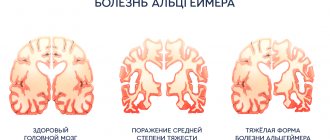Neuropsychology studies, for example, how the brain and nervous system influence human behavior - and vice versa: how sensations in the body affect the same brain and nervous system. This means that if you intentionally evoke certain sensations in the body, you can consciously and in a comfortable environment control the child’s condition.
The use of neuropsychological methods is especially important in preschool age, when the child’s brain is actively developing and the foundation of the nervous system is being created. If you do not prepare properly, behavioral traits that are not yet noticeable will affect the child’s life in middle and high school age, when it will be much more difficult to correct perceptions. Psychological preparation for the first grade involves the development of attention, perception, emotional sphere, memory, thinking, speech and self-control functions, increasing perseverance, endurance and performance. Neuropsychological games and exercises will not only help prepare your child for school, but can also easily be integrated into everyday life, activities or regular games.
Main responsibilities
A neuropsychologist studies the individual characteristics of the patient’s psyche and provides effective treatment. This makes it possible to improve the patient’s social adaptation to certain living conditions. In medicine, it is customary to distinguish two branches - adult and child neuropsychology. The second industry is just developing. The same specificity is used to determine the nature of the violation.
The main methods of neuropsychology are aimed at studying:
- personal characteristics;
- behavioral characteristics;
- voluntary actions and movements;
- cognitive processes (memory, speech, thinking, perception).
Scientific methods include:
- Comparative anatomical method. It is based on the principle of establishing a relationship between the way of life, behavior and the individual characteristics of the structure of the nervous system. With its help, the principle of operation of the brain is determined.
- Irritation method. It consists of analyzing mental functioning when exposed to the brain. The principle of influence can be direct, indirect, or through stimulation of individual neurons in the cerebral cortex.
Neuropsychology is still developing, and the human brain is not well understood.
Psychiatrist
People who feel a direct threat to their life and the integrity of their personality go to a psychiatrist. As a rule, clients come to a psychiatrist from other colleagues - psychologists and psychotherapists. Here, treatment is mainly carried out with medication - after all, the specialist is dealing with a serious disease that has affected the human brain. Only a psychiatrist can make a diagnosis such as schizophrenia, clinical depression or manic-depressive psychosis. The best option in such severe cases is the joint work of a psychiatrist and psychotherapist/psychologist, so that drug treatment is supported by professional psychological help.
Back Next
Diseases in the section of neuropsychology
A neuropsychologist often works with children who have the following disorders:
- cerebral palsy;
- hyperactivity;
- attention deficit disorder;
- delays in speech development;
- slowness and lack of independence;
- difficulties in adapting to society;
- reluctance to study and practice;
- increased fatigue;
- slow assimilation of the school curriculum.
Deviations can be corrected only for children under 12 years of age: during this period, functional disorders are best amenable to correction.
The doctor helps children who have limited mental abilities. Such pathologies can be congenital or acquired after suffering trauma. In the latter case, such pathological phenomena can occur in adults.
A neuropsychologist selects and develops an individual program for the child. It is educational in nature. These can be various tasks aimed at improving speech, memory, and thinking.
A clinical psychologist in the field of neuropsychology works with adults after suffering serious illnesses, physical or mental trauma.
Psychologist
The main difference between a psychologist and a psychiatrist is that he works with relatively healthy people, so this specialist is unlikely to help a person who hears voices or suffers from severe depression. The reason for this specialization is simple: a psychologist is a person with a humanities education, not a doctor. It can help you socialize in a new environment, achieve self-realization, highlight the strengths and weaknesses of your personality, sort out small family conflicts, identify the causes of general dissatisfaction with life, and normalize your self-esteem, but it cannot prescribe you an antidepressant. But it’s quite easy to get to him for free: psychologists are always available in clinics, schools, kindergartens, and large companies. In addition, they work on free hotlines and psychological assistance centers.
A psychologist can not only work with clients privately, but also conduct all kinds of trainings and team building, help with personnel selection and workplace organization, and assist doctors and forensic experts. Such a wide range of responsibilities determines a huge number of subtypes of psychologists: from specialists in general psychology, mainly engaged in science, to psychologists in applied industries, dealing with a narrow range of problems (for example, family or sports psychologist).
When to see a neuropsychologist
You should consider the main signs that signal the presence of a problem that a neuropsychologist will help solve.
If your baby has at least one of the problems described below, then you need to contact the clinic and get the appropriate advice:
- poor memorization and reproduction of oral or written speech;
- misunderstanding of others;
- violation of fine and gross motor skills;
- lack of understanding of the correct form of grammatical structure of speech;
- fast fatiguability;
- difficulties in self-organization and problems with neatness;
- omission of letters or words in spoken or written speech;
- instability of the emotional background;
- low concentration and perseverance.
A neuropsychologist will conduct special testing in the form of a game, ask the child questions and develop an individual program.
Association of Child Neuropsychologists
1. General provisions 1.1. The policy regarding the processing of personal data (hereinafter referred to as the Policy) is aimed at protecting the rights and freedoms of individuals whose personal data is processed by individual entrepreneur N. V. Zhestkov (hereinafter referred to as the Operator). 1.2. The policy was developed in accordance with clause 2, part 1, art. 18.1 of the Federal Law of July 27, 2006 No. 152-FZ “On Personal Data” (hereinafter referred to as the Federal Law “On Personal Data”). 1.3. The Policy contains information subject to disclosure in accordance with Part 1 of Art. 14 Federal Law “On Personal Data”, and is a publicly available document. 2. Information about the operator 2.1. The operator operates at the address 664009, Irkutsk, st. Yadrintseva, 1/2, 17. 2.2. Head Nikita Vladimirovich Zhestkov (phone +7 (964) 111-8758) is appointed responsible for organizing the processing of personal data. 2.3. The database of information containing personal data of citizens of the Russian Federation is located at: mailigen.ru, in-scale.bitrix24.ru, mail.yandex.ru. 3. Information about the processing of personal data 3.1. The Operator processes personal data on a legal and fair basis to fulfill the functions, powers and duties assigned by law, to exercise the rights and legitimate interests of the Operator, the Operator’s employees and third parties. 3.2. The operator receives personal data directly from the subjects of personal data. 3.3. The operator processes personal data in automated and non-automated ways, with and without the use of computer technology. 3.4. Actions for processing personal data include collection, recording, systematization, accumulation, storage, clarification (updating, changing), extraction, use, transfer (distribution, provision, access), depersonalization, blocking, deletion and destruction. 3.5. Databases of information containing personal data of citizens of the Russian Federation are located on the territory of the Russian Federation. 4. Processing of clients’ personal data 4.1. The Operator processes personal data of clients within the framework of legal relations with the Operator, regulated by part two of the Civil Code of the Russian Federation of January 26, 1996 No. 14-FZ (hereinafter referred to as clients). 4.2. The operator processes personal data of clients in order to comply with the laws of the Russian Federation, as well as for the purpose of: - concluding and fulfilling obligations under contracts with clients; — carry out the types of activities provided for by the constituent documents of IP Zhestkov N.V.; — inform about new products, special promotions and offers; — inform about new articles, videos and events; — identify the need for products; — determine the level of job satisfaction. 4.3. The operator processes personal data of clients with their consent provided for the duration of the contracts concluded with them. In cases provided for by the Federal Law “On Personal Data,” consent is provided in writing. In other cases, consent is considered to be obtained when concluding an agreement or when performing implied actions. 4.4. The operator processes personal data of clients during the validity period of contracts concluded with them. The operator can process personal data of clients after the expiration of the contracts concluded with them during the period established by clause 5, part 3, art. 24 parts of the first Tax Code of the Russian Federation, part 1 of Art. 29 Federal Law “On Accounting” and other regulatory legal acts. 4.5. The operator processes the following personal data of clients: - Last name, first name, patronymic; — Type, series and number of identification document; — Date of issue of the identity document and information about the issuing authority; - Year of birth; - Month of birth; - Date of Birth; - Place of Birth; - Address; — Contact phone number; - E-mail address; — Taxpayer identification number; — Number of the state pension insurance certificate; - Job title; - Photo. 4.6. To achieve the purposes of processing personal data and with the consent of clients, the Operator provides personal data or entrusts their processing to the following persons: - sales manager - project manager - project manager - marketer 5. Information on ensuring the security of personal data 5.1. The operator appoints a person responsible for organizing the processing of personal data to fulfill the duties provided for by the Federal Law “On Personal Data” and the regulatory legal acts adopted in accordance with it. 5.2. The Operator applies a set of legal, organizational and technical measures to ensure the security of personal data to ensure the confidentiality of personal data and their protection from unlawful actions: - provides unlimited access to the Policy, a copy of which is posted at the Operator’s location address, and can also be posted on the Operator’s website ( if available); — in pursuance of the Policy, approves and puts into effect the document “Regulations on the processing of personal data” (hereinafter referred to as the Regulations) and other local acts; — familiarizes employees with the provisions of the legislation on personal data, as well as the Policy and Regulations; — provides access to employees to personal data processed in the Operator’s information system, as well as to their material media only for the performance of job duties; — establishes rules for access to personal data processed in the Operator’s information system, and also ensures registration and accounting of all actions with it; — assesses the harm that may be caused to personal data subjects in the event of a violation of the Federal Law “On Personal Data”; — identifies threats to the security of personal data during their processing in the Operator’s information system; — applies organizational and technical measures and uses information security tools necessary to achieve the established level of personal data security; — detects facts of unauthorized access to personal data and takes response measures, including restoration of personal data modified or destroyed as a result of unauthorized access to it; — assesses the effectiveness of measures taken to ensure the security of personal data before putting the Operator’s information system into operation; — carries out internal control over the compliance of the processing of personal data with the Federal Law “On Personal Data”, regulations adopted in accordance with it, requirements for the protection of personal data, Policy, Regulations and other local acts, including control over the measures taken to ensure the security of personal data and their level of security during processing in the Operator’s information system. 6. Rights of personal data subjects 6.1. The subject of personal data has the right: - to receive personal data relating to this subject and information regarding their processing; - to clarify, block or destroy his personal data if they are incomplete, outdated, inaccurate, illegally obtained or are not necessary for the stated purpose of processing; — to withdraw the consent given by him to the processing of personal data; - to protect their rights and legitimate interests, including compensation for losses and compensation for moral damage in court; — to appeal the actions or inaction of the Operator to the authorized body for the protection of the rights of personal data subjects or in court. 6.2. To exercise their rights and legitimate interests, personal data subjects have the right to contact the Operator or send a request personally or with the help of a representative. The request must contain the information specified in Part 3 of Art. 14 Federal Law “On Personal Data”
Diagnosis of diseases
When going to the hospital, an external examination and conversation may not be enough. The main responsibility of the doctor is to establish the cause of the deviation, so laboratory and instrumental tests may be required: a blood test is taken, ultrasound, CT or MRI, and x-rays are prescribed.
A specialist can prescribe treatment in combination with a course of recovery or correction.
The method of testing by a neuropsychologist includes research:
- motor function;
- writing, counting and reading;
- ability to recognize objects;
- level of intellectual development;
- memory;
- speech skills;
- dominant hemisphere - left-handedness or right-handedness.
The examination takes place in the form of exercises; the doctor directs the child to perform the necessary actions. After checking, appropriate exercises are selected. This makes the recovery process more efficient.
Training to become a Neuropsychologist
Universities
Moscow State University named after M.V. Lomonosov
Clinical psychology (Faculty of Psychology, M.V. Lomonosov Moscow State University)
Ural Federal University named after the first President of Russia B.N. Yeltsin
Clinical psychology (Ural Humanitarian Institute, UrFU)
Chelyabinsk State University
Clinical psychology (Faculty of Psychology and Pedagogy)
Russian State Humanitarian University
Clinical psychology (Institute of Psychology named after L.S. Vygotsky Russian State University for the Humanities)
First Moscow State Medical University named after. I.M.Sechenova
Clinical psychology (I.M. Sechenov First Moscow State Medical University)
To become a specialist in this profile, you first need to obtain a higher education in the profession of “clinical psychologist”. Next, you need to improve your qualifications in graduate school, at the same time defend your candidate's dissertation, and then your doctorate.
Treatment of pathologies
Classes with a neuropsychologist may include a special set of exercises related to breathing. The duration will depend on the degree of complications and the age of the child.
Classes are aimed at:
- Increased energy potential, improved muscle tone, memory and attention. Basic exercises: breathing, stretching, a combination of relaxation and tension.
- Improved motor coordination and sensory perception. Basic exercises are aimed at developing a sense of rhythm, developing memory and movements in various directions.
- Self-organization, when the child develops self-control, the ability to follow instructions and adhere to the rules.
The exercises can be performed while standing, lying down or sitting. It is advisable that the whole family be involved in the process; all movements must be worked out at home.
A neuropsychologist does not treat the underlying disease. His services are used during the patient’s rehabilitation process, when the cause of the disease has been eliminated. There are cases when the main treatment for a deviation can only be neuropsychological.
Warm-up exercises
Small warm-up exercises are successfully integrated into the child’s regular activities. There is a whole group of balance exercises that involve you in play and also stimulate the cerebellum.
Lay a string on the floor and ask the children to walk from one end to the other, stepping only on the string.
Have your child jump or stand on one leg. Alternate between your left and right legs and reinforce the concept of “left-right” at the same time.
Invite your child to stand on one leg, without swaying, with his eyes closed, listening to a variety of music, gradually increasing the duration of the exercise from lesson to lesson.
On the playground, ask the children to walk along logs and narrow paths, be sure to help them.
Salary as of 07/30/2020
Russia 30000—120000 ₽
Moscow 25000—120000 ₽
The salary of a neuropsychologist depends on the country and region in which he operates. Directly in Moscow, an employee who has just started practicing receives about 20,000 rubles, and an experienced specialist earns 50,000 rubles. Payment for the work of a professional specialist in the field of neuropsychology can be more than 90,000 rubles. Those in private practice can earn much more, provided that they truly have fundamental knowledge in the field of neuropsychology.










